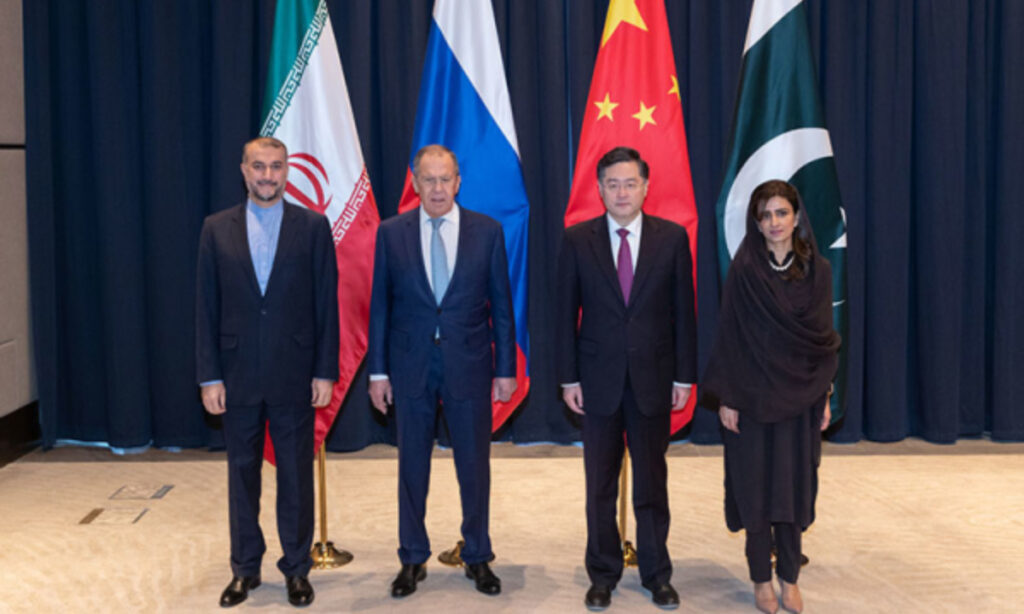A stable and peaceful Afghanistan is in the interests of all members of the international community, and the country should be a venue for international cooperation rather than a stage for geopolitical rivalries, foreign ministers of China, Russia, Pakistan and Iran stressed at the Second informal Meeting on Afghanistan in Samarkand, Uzbekistan on Thursday.
The ministers reiterated respect for the sovereignty, independence and territorial integrity of Afghanistan, and support for the “Afghan-led, Afghan-owned” principle to determine the country’s political future and development path, according to a joint statement issued upon the meeting, according to the Chinese Foreign Ministry on Friday.
The four countries emphasized deep concerns regarding the terrorism-related security situation in Afghanistan, urging the Afghan interim government to take a more visible and verifiable approach in upholding its commitments on counter-terrorism.
The Afghan authority should take effective measures to protect the safety, security and legitimate rights of foreign institutions and citizens, the joint statement read.
It also stressed the need for Afghan authority to promote inclusive governance, cancel all restrictive measures on women and ethnic minorities, and maintain a friendly and cooperative foreign policy.
Addressing the global concern of women’s rights issues, Chinese Foreign Minister Qin Gang said only with social stability, security and economic development can women’s rights and interests be fundamentally protected there. He called on the international community to look at the Afghan issue in a comprehensive, balanced and objective manner.
Foreign ministers of the four countries have also brought up the Afghan refugee issue in the statement, calling on the international community to provide necessary support and assistance.
Zhu Yongbiao, director of the Center for Afghanistan Studies at Lanzhou University, told the Global Times on Friday that the statement will play a synergistic and comprehensive role in promoting the resolution of the Afghan issue, contributing to the long-term stability of the country. It has also served as an effective communication channel with the Afghan Taliban on the core concerns of its neighbors, including counter-terrorism, the protection of women’s rights, and the refugee problem.
Refuting Western media which has hyped Beijing’s growing engagement with Kabul as an effort to expand Beijing’s regional influence, Zhu said China, as a responsible global power and a close neighbor of Afghanistan, is willing to reach out a helping hand.
What’s more, the Afghan people themselves and other surrounding nations look forward to China’s playing a constructive role in the peaceful reconstruction of the war-torn country, which is in sharp contrast to that of the West, as it is more moderate, pragmatic and can avoid potential conflicts that are left by long-standing issues.
In the statement, the foreign ministers pointed out that NATO countries should bear primary responsibility for the predicament in Afghanistan, and urged them to instantly lift unilateral sanctions against Afghanistan and return its overseas assets.
They expressed firm opposition to the reestablishment of military bases in and around Afghanistan by these countries responsible for the current situation.
“The US’ failure in Afghanistan is multifaceted,” said Qin. “First, it was a military failure, as the 20-years occupation of US troops in the country has not brought a moment of peace but conflict and unrest. It was also a political failure. Western ‘democratic transformation’ of Afghanistan has only left its national reconciliation unresolved until now.”
The US’ failure in fighting terrorism in the Central Asia country is seen from a rising numbers of terrorist groups, the number of which surging from no more than 10 two decades ago to over 20 today, leaving a huge “security black hole.”
“Military withdrawal does not mean the US’ responsibility is lifted,” Qin stressed. He urged the politically driven actors to stop sitting aback and ignoring the current hardships of the Afghan people, but to return their hard-earned money as soon as possible.
Source: Global Times


